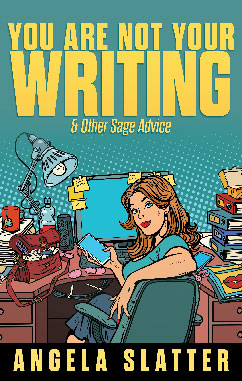 If I were to tell you that this little chapbook lit a fire under my proverbial, would that be enough? Could we call it a day?
If I were to tell you that this little chapbook lit a fire under my proverbial, would that be enough? Could we call it a day?
This book could be summarised by one sharp and yet effective line: Stop being tragic and get back to work.
As a writer, advice comes at you from every corner imaginable.
There’s advice on Being A Writer, advice on Being A Writer Online, advice on branding, pitching, marketing, leveraging networks, submitting, and every manner of technique that you can imagine.
The trouble is that a lot of this advice is written for You, Writer. What Angela Slatter has opened is advice for You, Who Writes.
Lest the small but important grammatical difference elude you, the first sees you as the activity, and the latter sees you as a human. It’s a small trap, one that’s easy to fall into.
Even critics have been apt to consider that the act is inseparable from the artist, which you see in legions of writers whose works have been ‘cancelled’.
What Slatter reminds writers is that they write because they want to. That getting caught up in all the other trappings is a fast way to becoming You, Who Used To Write.
Of great import are Slatter’s reminders that time takes on a different character when you stop identifying yourself as your activity. She points out that awards are as much a downfall as a blessing; even that it’s ok to write and not to publish.
She reminds you that the work is hard, and hints that this is why establishing a working relationship with other writers is so important.
One of the downsides of our always-online culture is imagining that being published is the end game, otherwise the activity doesn’t count. The authors who rock their social media appear to be smashing it in all directions.
The reality is that this is just a show reel: It obscures all the time spent offline, engaged in this work in which they’re fighting the same battles and insecurities.
Slatter’s exhortations to do only what’s necessary so you can focus on your craft are much needed. While she points out that, yes, you must be findable online; and, yes, you also need community. But the point is to write as you, for you, and everything else be damned.
There is only one aspect of this book to which I took enormous exception, and that is the idea that writers are drinkers. I know it’s a playful stereotype, but this author is clearly a drinker. If she weren’t, she wouldn’t create the feeling that it’s ok to drink when disappointed.
Given the nature of writing and the place of rejection in this type of creative life, I fear that who dreams of being published may soon find him- or herself more interested in the drink than the art.
You Are Not Your Writing & Other Sage Advice is published by Brain Jar Press. For more information, visit: www.brainjarpress.com for details.
Image: You Are Not Your Writing & Other Sage Advice – courtesy of Brain Jar Press
Review: Leticia Mooney
